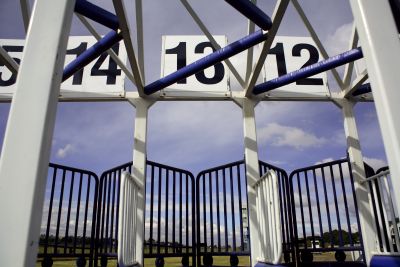
One of my readers writes, 'My friends and I love to go to the thoroughbred horse racing tracks in Florida. We have good jobs that pay well with the Space Program and we would like to keep our money. What tips can you give us to keep us from losing when we go to Hialeah or Gulfstream?'

That is quite a question. How much time do you have to listen to a proper answer?
The truth is, there are hundreds of factors that go into determining a winner in a horse race. The horse's present form is so important that it cannot be over-emphasized. While a horse's workouts are supposed to be publicized, that is not always the case.
Trainers often conceal a really good workout by holding it in the early morning hours before anyone is at the race track. That is why the 5-1 odds on a horse in race 3 suddenly plunge to 7-2 just as the stewards close the starting gate or even after the race has started.
When that happens, friend, it isn't public money you're looking at -- it's track money being wagered by the owner, the trainer, the jockey and all their friends and relatives who are in the know.
Sometimes an outstanding workout will be posted. If this ever happens, you should act on it. I remember the Saturday morning when I picked up a Daily Racing Form for Turf Paradise in Phoenix, AZ. A first-time starter was entered in a maiden race. The horse had worked three furlongs in 34.2 seconds breezing from the gate.
The morning line odds for the maiden was 12-1. I tucked the Racing Form in my coat pocket and headed for my car, planning to bet $20 across the board on the pony.
Oh, oh! My left rear tire was flat. I hurriedly changed the tire and headed out to the track, 30 minutes away. I valet parked my car and ran into the grandstand. I arrived one minute too late to make a bet.
In deep dismay, I saw my selection break from the gate like a Chinese rocket at 22-1 odds. The red roan with a light mane went right to the front with a three-length lead and never looked back. It paid $46.80 to win. My $60 bet across the board would have netted me more than $700!
Another important factor in handicapping a race is an equipment or jockey change. If a horse has been running decently and the trainer changes jockeys, anyone who ignores this does so at his own peril. Same is true if a trainer with a good winning percentage makes an equipment change like adding or removing blinders from his entry.
Post position is another factor you should consider. If the race is a mile or a mile and a sixteenth, the inside posts are much better than an outside post. However, if the race is six or seven furlongs, the outside posts seem to do much better than an inside post.
I like to bet on horses that have a win rate of at least 20 percent and a win-place winning rate of 50 percent. A horse that is used to winning or placing will generally keep up the good work.

A key factor in a race is pace. If one horse has early speed and there are several closers, go with the speed. If there are three or more horses with early speed, your choice should be the closer.
Observe the body language of the horses as they work out or approach the starting gate. A race horse is simply an athlete with four legs. If the horse feels good and wants to run it will show it by the sheen of its body, the arched neck, the prancing legs, the ears pricked forward as though it is listening to all the sounds around it, and the tail straight back like a plume.
Don't bet a horse that is covered with lather or sweat. This animal is washed out and has probably left its race back in the stables.
Other factors that you should consider are the horse's earnings, best distances and whether it had trouble in its last race. Watch the betting pattern as listed on the tote board. If a horse's morning line odds are cut in half, that probably means track money is backing it -- and so should you.
How you bet the horse is another factor you should consider before the race starts. Do you want to buy a win ticket, an exacta linking the horse up with another horse, or a place ticket? You can follow your leaning and conscience here, but if it was me -- I would stick to win and place.
Horse racing has been nicknamed the Sport of Kings. The nickname came from the fact that kings and royalty had the money to spend on horse races -- and the peons did not.
Finally, before I ever would bet on a horse, I would pick up a copy of one of Andrew Beyer's books on speed ratings. Beyer is one of the world's greatest horse handicappers and his speed ratings can help you get a handle on which horse has the real speed in the race.
Good luck at the track. If you decide to go and follow these rules, let me know how you do. Our readers would like to know.
Author: Geno Lawrenzi Jr.
(Geno Lawrenzi Jr. is an international journalist, magazine author and ghostwriter. If you have a unique gambling story to share with him, you may qualify for a cash award. Send your story with all the details to glawrenzi@gmail.com ).
Your feedback
Please enter your comment.
Your comment is added.




